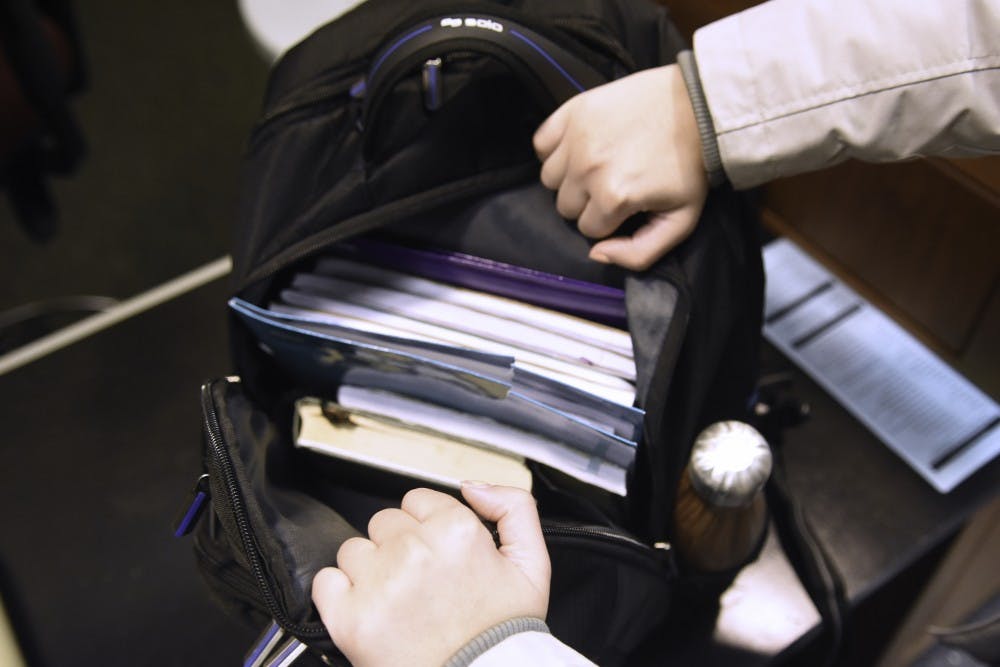
Van Pelt Library is preparing to abolish bag checks by the end of the semester, Vice Provost and Director of Penn Libraries Constantia Constantinou announced.
“Over the course of the spring semester, we will be implementing new systems and technologies in our circulation and security departments that will allow us to remove the existing bag check policy," Constantinou wrote in an email to The Daily Pennsylvanian.
Peter Collins, director of public services and head of LIBRA at Penn Libraries, conducted a review of Van Pelt’s security system and decided they could move away from bag checks at the library's exit. While the procedural changes are still in the works, Collins met with Public Safety on Jan. 22 and said the bag checks could be eliminated as early as next week.
"After an assessment of our security system, consultations with our collection librarians, and interviews with colleagues at peer institutions the policy of bag checks seemed to have outlived its purpose," Collins said, adding that the policy was "outdated" because of Van Pelt's improved security of its research collection.
Without the bag checks, people would still have to hand over library books to a security guard before they exit.
College freshman Ruby Lee said she studies in Van Pelt about twice a week and that she always brings her laptop and notes to study, but rarely borrows books from Van Pelt.
“The whole bag check is there to make sure people don’t steal books, but I feel like the majority of people don’t come to Van Pelt to even check out books, so I guess it’s good that they’re taking it away,” Lee said.

Without the bag checks, people would still have to hand around over library books to a security guard before they exit.
College freshman Noah Moyse has only borrowed one book from Van Pelt for a research paper he was working on last semester.
“I think that the only way for it to be feasible is if they did a really thorough search of your bag, checking all compartments,” Moyse said. “But also doing that would take up too much time. It would be a good idea in theory but I don’t think it really works out in practice.”
Students are also left questioning how effective the current bag check policy is given the lack of accessible data.
College junior Bevan Cohen said in order for her to judge its effectiveness, she would need to know the number of books that go missing from the library each year. She added that she would want to compare the current number of stolen books each year with new data a year from now after the bag check policy has been removed.
Some students also say the bag check may be more theatrical than effective at preventing thefts.
“I don’t really get the point of the bag check to be honest, because they don’t even check it. It’s just like a procedure," Lee said.
“I do think there's an element of we don't really know how much it prevents, because prevention is hard to measure,” Collins said. “You can measure when there's a problem and you find it, but it's hard to measure prevention.”

Van Pelt’s bag check was at first meant to identify checked out books before the library got a modern security system.
Van Pelt’s bag check was initially implemented because some materials were not yet incorporated into the modern security system and wouldn't set off the gate alarm. It also aimed to help keep people's laptops and other possessions safe.
In the late 2000s, there were several instances of theft in the building, and the bag check helped control people attempting to leave the building with other people's belongings. Although a security guard cannot necessarily tell whether a computer belongs to someone else, if someone leaves with three laptops, then it raises a red flag, Collins said. He added, however, that laptop theft has become a less prominent issue in recent years.
Van Pelt is home to millions of volumes from the past two hundred years, many of which are rare or irreplaceable. Collins said because of this, it has taken time to fully implement and change the library's security procedures.
But students will soon be able to exit Van Pelt “without having to feel like they’re going through a gauntlet," Collins said.
The Daily Pennsylvanian is an independent, student-run newspaper. Please consider making a donation to support the coverage that shapes the University. Your generosity ensures a future of strong journalism at Penn.
Donate







